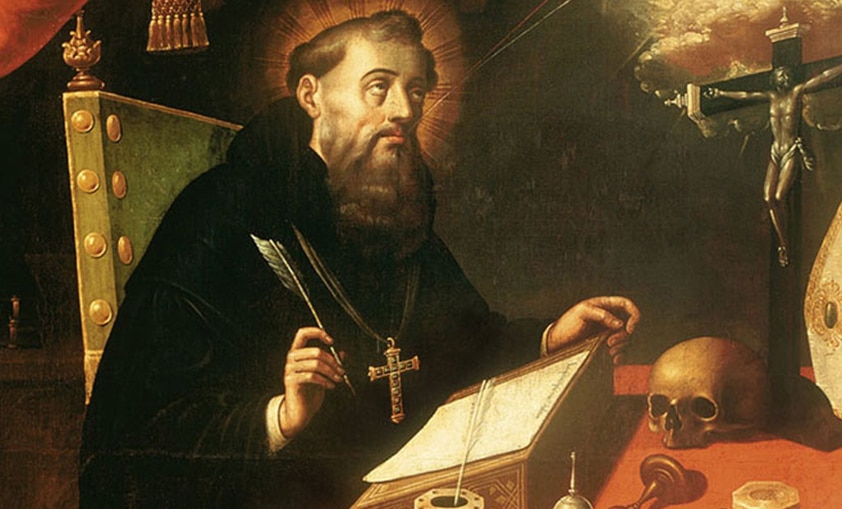Many of us have probably heard St. Augustine and his writings referenced in homilies since he’s a great saint and doctor of the Church. He was a bishop in the late 300s-early 400s A.D., and one of the greatest minds in Church history, so he might not quite seem terribly relevant to our daily life as singles. At first glance.
In actuality, this is a guy with a lot to offer for anyone who has struggled with temptations to unchastity and our culture’s “anything goes” mentality. And, reflecting on his life can show us some reasons not to be too quick to jump to judgments about others based on their pasts.
St. Augustine’s Early Life of Hedonism

Despite being raised by his holy mother whom we now know as St. Monica, St. Augustine wasn’t always the type of holy man we typically think of when we hear things like “saint” and “Doctor of the Church.”
During his early school years, he became acquainted with paganism, along with all its practices. He would later discuss in his book Confessions that he had his first experience with deliberate sin around this time when he and some friends stole fruit that they didn’t want to eat. He had been attracted to the idea of doing something not permitted, and he said about the incident, “I loved my own error—not that for which I erred, but the error itself.”
A few years later, though, his sin was taking on a different character, as he fell in with some friends who had the habit of what could be considered the 4th century equivalent of locker room talk. The result was that Augustine, at the time rather innocent and inexperienced, felt pressured to gain sexual experience. And so he did—a lot.
Maybe you’ve even heard of his famous, misguided prayer, “Grant me chastity… but not yet.” By 19, he was beginning an affair that would last years and produce an illegitimate child.
Any of This Sound Familiar?

St. Augustine underwent a massive conversion at age 31 and left his old lifestyle behind. But I have to think that the struggles and falls of St. Augustine’s early life are not so very different from the temptations that many modern Catholic singles face in their daily lives.
Any of us who have spent some time in the world can probably attest that there is a lot of sexual conversation going on around us among our nonreligious single friends. And for some reason (I’m looking at you, Fall of Adam and Eve), we are very attracted to even the idea of sin.
Sometimes it’s just the appeal of the forbidden fruit, not unlike the literal fruit Augustine stole. And sometimes it’s the actual draw of the pleasures our worldly companions have no qualms about describing. But either way, it’s easy for us to fall into those sins that the world says are okay, possibly even if we’ve had the benefit of someone with St. Monica’s holiness raising us in the faith and praying for us throughout life – and let’s be honest, most of us haven’t had that benefit.
The good news, though, in light of St. Augustine’s life, is right there in his name—the “Saint” part of it, I mean. He overcame all his huge past sins, and became one of the greatest saints in Church history.
Getting Past the Past

Hopefully, most of us haven’t had to overcome anything as radically sinful as St. Augustine’s years of hedonism, to get to where we are now in our faith.
Perhaps some of us never had any big patterns of mortal sin in our past. On my part, I was one of those annoying goody-two-shoes teenagers who never rebelled and was graced with a fairly early understanding of why I wanted to be a good Catholic. And yet, St. Augustine’s life is still very relevant to me and anyone who has had similar life experiences of straight-and-narrow-ness.
How easy is it to look at those worldly companions of ours, as they brag about their hookups and scores, and to assume there’s no conversion in their future? I would have to guess that most people in St. Augustine’s life (excluding his holy mother) assumed he would continue on in his early lifestyle forever. And look at him now.
In the same vein, it can be very easy for us to look at those who have had a conversion experience as somehow less worthy, or damaged goods, because of their past. This is probably especially true in the case of sexual sins.
Virginity has value, and it is natural for a Catholic man or woman to hope for a future spouse who is sexually inexperienced. But at the same time, God created confession for a reason. If God can forgive past sexual sin, we should certainly not be hung up on it ourselves.
And on the other side, for those who struggle with forgiving their own past mistakes, let us take St. Augustine as a particular patron and be heartened by knowing that if God can do such great things in the life of someone with Augustine’s past, He can do them in any life.



